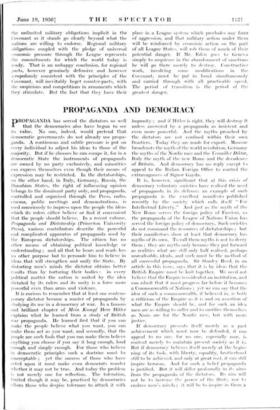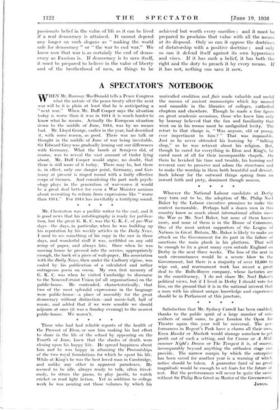PROPAGANDA AND DEMOCRACY
PROPAGANDA has served the dictators so well that the democracies also have begun to see its value. No one, indeed, would pretend that democratic governments do not already use propa- ganda. A continuous and subtle pressure is put on every individual to adjust his ideas to those of the majority. But if he chooses he can escape it, for in a democratic State the instruments of propaganda are owned by no party exclusively, and minorities can- express themselves even though their means of expression may be restricted. In the dictatorships, on the other hand, in Italy, Germany, Russia, the Danubian States, the right of influencing opinion belongs to the dominant party only, and propaganda, controlled and organised through the Press, radio, cinema, public meetings and demonstrations, is used consciously to impress upon the people the ideas which its rulers either believe or find it convenient that the people should believe. In a recent volume, Propaganda and Dictatorship (Princeton University Press), various contributors describe the powerful and complicated apparatus of propaganda used by the: European dictatorships. The citizen has no other .means of obtaining political knowledge or understanding ; and all that he hears and reads has no other purpose but to persuade him to believe in ideas:that will strengthen and unify the State. By distorting men's minds the dictator obtains better results than by torturing their bodies : in every political matter the nation is united by the idea dictated by its rulers and its unity is a force more powerful even than arms and violence.
It is curious to remember that at least one contem- porary dictator became a master of propaganda by studying its use in a democracy at war. In a famous and brilliant chapter of Mein Kampf Herr Hitler explains what he learned from a study of British war propaganda. He learned first that if you can make the people believe what you want, you can make them act as you want, and secondly, that the people. are such fools that you can make them believe anything you choose if you say it long enough, loud enough and simply enough. For those who believe in democratic principles such a doctrine must be inacceptable ; yet the success of those who have acted .upon it must make even democrats wonder whether it may not be true. And today the problem is not merely one for reflection. The toleration, limited though it may be, practised by democracies allows those who despise tolerance to attack it with impunity ; and if Hitler is right, they will destroy it unless answered by a propaganda as insistent and even more powerful. And the myths preached by the dictators are not confined within their own frontiers. Today they are made for export. Moscow broadcasts the myth of the world revolution, Germany the myths of the Nordic race and the I 'ersailler Diktat, Italy the myth of the new Rome and the decadence of Britain. And democracy has no reply except to appeal to the Italian Foreign Office to control the extravagances of Signor Gayda.
It is, however, significant that at this crisis of democracy voluntary societies have realised the need of propaganda in its defence: an example of such propaganda is the excellent manifesto published recently by the society which calls itself " For Intellectual Liberty." And just as the myth of the New Rome serves the foreign policy of Fascism, so the propaganda of the League of Nations Union has served the foreign policy of democracy. Such societies do not command the resources of dictatorships ; but their manifestoes show at least that democracy has myths of its own. To call them myths is not to decry them : they are myths only because they put forward as realities what arc still only half realised, perhaps unrealisable, ideals, and such must be the method of all successful propaganda. Sir Stanley Reed, in an article in this issue, says that it is by ideas that the British Empire must be knit together. We need not believe that the Empire is so idealist an institution, and can admit that it must progress far before it becomes a Commonwealth of Nations ; vet we can say that the idea of such a commonwealth, if believed in, is both a criticism of the Empire as it is and an assertion of what the Empire should be, and for such an idea men arc as willing to suffer and to sacrifice themselves as Nazis arc for the Nordic race, but with more justice.
If democracy presents itself merely as a past achievement which must now he defended, it can appeal to no one, for no one, especially now, is content merely to maintain present society as it is. But if democracy believes itself merely at the begin- ning of its task,. with liberty, equality, brotherhood still to be achieved, and only at great cost, it can stilt inspire heroism. And for such a belief propaganda is justified. But it will differ profoundly in its aims from the propaganda of the dictators. Its aim will not be to increase the power of the State, nor to enslave men's minds : it will be to inspire in them a passionate belief in the value of life as it can be lived if a real democracy is attained. It cannot .depend any longer on such slogans as " making the world safe for democracy " or " the war to end war." We know now that war is as certainly the end of demo- cracy as Fascism is. If democracy is to save itself, it must be prepared to believe in the value of liberty and of the brotherhood of men, as things to be achieved but worth every sacrifice : and it must be prepared to proclaim that value with all the means at its disposal. Only so can it oppose the doctrines of dictatorship with a positive doctrine ; and only so can it defend itself against its own hypocrisies and vices. If it has such a belief, it has both the right and the duty to preach it- by every means. If it has not, nothing can save it- now.











































 Previous page
Previous page